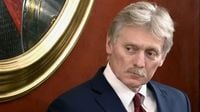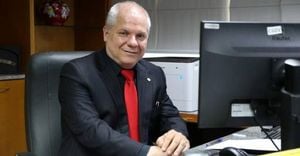On April 23, 2025, Dmitry Peskov, the spokesman for the Kremlin, made a bold declaration regarding the ongoing conflict in Ukraine, stating that hostilities could end immediately if Kiev withdrew its forces from four regions that Russia has annexed. These regions—Zaporizhia, Kherson, Lugansk, and Donetsk—were incorporated into Russia's constitution following controversial referendums in 2022. Peskov emphasized that the recognition of these territories as part of Russia is non-negotiable, framing it as a prerequisite for any ceasefire agreement.
During a press briefing, Peskov reiterated Moscow’s stance that Ukraine must adopt a neutral status, suggesting that this condition is essential for fostering any positive relations between the two countries. He stated, "The conflict will end immediately if Ukraine withdraws its troops from the four regions," highlighting the Kremlin's firm position on territorial integrity.
President Volodymyr Zelensky of Ukraine responded to these developments on April 22, firmly asserting that Kiev would not entertain discussions about recognizing Crimea as part of Russia. His comments came at a time when diplomatic efforts to negotiate peace were already under strain. Zelensky's administration has consistently maintained that any negotiations regarding peace terms should only occur after hostilities cease, a sentiment that underscores the complexity of the current situation.
Meanwhile, U.S. President Donald Trump, on the same day, expressed his intention to approach trade negotiations with China without a hardline stance. This statement coincides with his administration's involvement in the Ukraine conflict, where he has been pushing for a resolution that includes compromises from both sides.
As the peace talks falter, U.S. Vice President JD Vance, speaking from India, indicated that it is time for both Russia and Ukraine to make a decision or risk the U.S. withdrawing from the negotiation process altogether. He mentioned that the current U.S. proposal includes several territorial exchanges, which may not align with the existing borders controlled by either side post-conflict. Vance emphasized the need for both parties to lay down their arms and focus on rebuilding their nations, stating, "To end casualties, Moscow and Kiev need to lay down their weapons, freeze fighting and continue building a better Russia and Ukraine."
Trump expressed optimism about reaching a resolution in the coming week, indicating that negotiations could lead to a comprehensive agreement. This optimism is, however, tempered by the acknowledgment that significant concessions will be required from Zelensky’s government. Reports suggest that a document presented to Ukraine on April 17, during a meeting in Paris with British and French delegations, included clauses demanding substantial compromises from Ukraine, potentially including tacit recognition of Crimea as Russian territory.
The backdrop to these negotiations is a complex web of geopolitical interests, with the Kremlin asserting that Ukraine's neutrality is essential for future relations. Peskov's comments reflect a long-standing Russian narrative that has been reiterated by President Vladimir Putin, who noted in November 2024 that without Ukraine's neutrality, it would be challenging to envision any amicable relations between the two nations.
As the situation continues to evolve, the U.S. has indicated that it may withdraw from negotiations if progress is not made soon. This potential withdrawal adds another layer of urgency to the talks, as both Russia and Ukraine face mounting pressure to reach an agreement. The recent announcement by the British Foreign Office that talks regarding a ceasefire will be postponed underscores the precarious nature of the negotiations. This postponement means key figures, including U.S. officials, will not be present, further complicating the diplomatic landscape.
In the midst of these discussions, the humanitarian toll of the conflict remains a pressing concern. With ongoing violence, the need for a resolution is more critical than ever. As both sides grapple with their demands, the international community watches closely, hoping for a breakthrough that could lead to lasting peace.
In summary, the current state of the Ukraine conflict reveals a stalemate characterized by entrenched positions on both sides. Moscow's insistence on territorial claims, coupled with Ukraine's refusal to concede, sets the stage for a challenging path forward. The U.S. involvement adds another dimension to the negotiations, with its leaders advocating for a balanced approach that considers the interests of all parties involved. As the situation develops, the world remains hopeful for a diplomatic solution that prioritizes peace and stability in the region.




